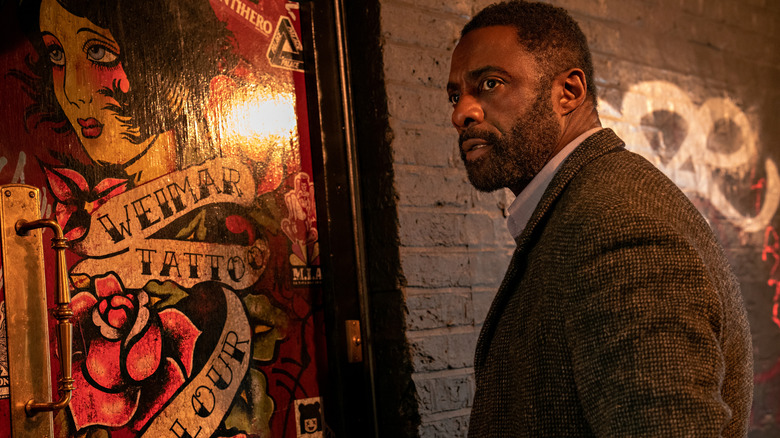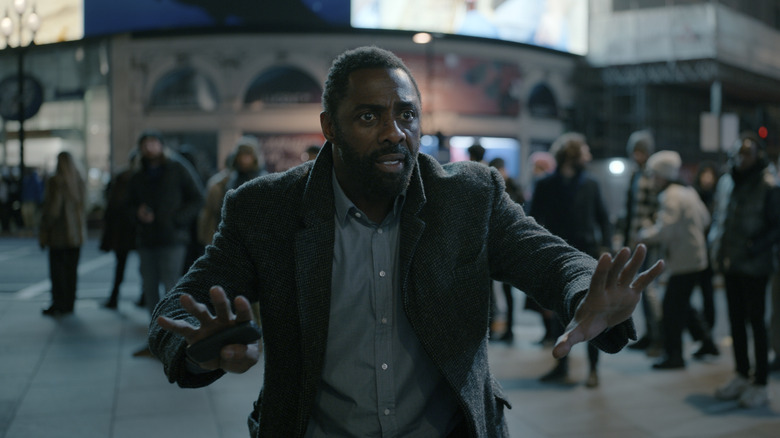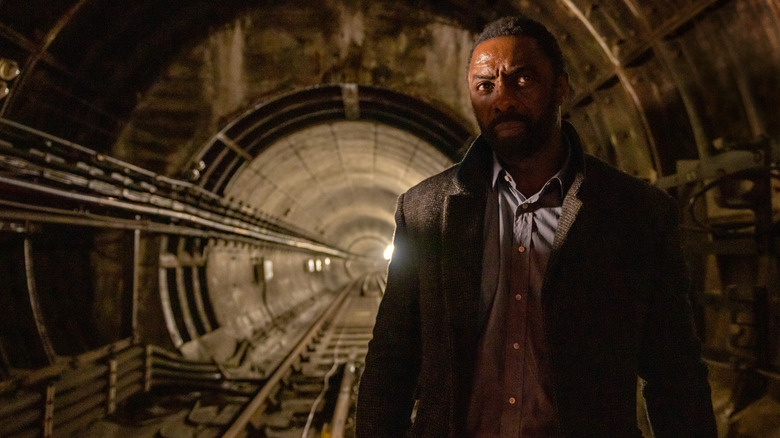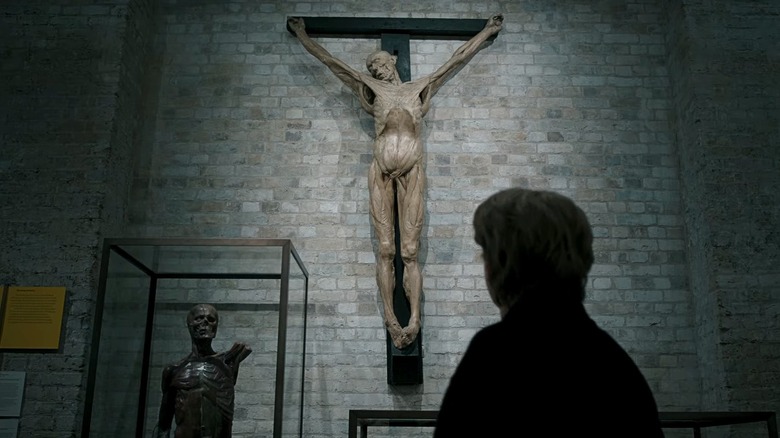Luther: The Fallen Sun Writer And Director On The Joys And Horrors Of John Luther's London [Exclusive Interview]
Over five seasons, Idris Elba's John Luther has encountered some of the worst monsters that London had to offer. From a chilling slasher who hides behind a Mr. Punch mask, to a killer who chooses his victims at random on the roll of a die, to a cannibal with Cotard's syndrome, the former DCI has seen the darkest sides of humanity.
Emphasis on "former," because "Luther: The Fallen Sun" finds its protagonist disgraced and behind bars. This is where fans of the show left him at the end of season 5, following a complex series of events, but the film provides its own explanation for Luther's incarceration so that newcomers can jump right in. Luther breaks out of his forced retirement after receiving a taunt from a serial killer whose case he'd been investigating. David Robey (Andy Serkis) specializes in psychological torment, using blackmail to puppeteer his victims in the lead-up to their deaths.
John Luther is no stranger to being controlled by blackmail himself; the show has seen him frequently taking the law into his own hands, fraternizing with psychopathic killer Alice Morgan (Ruth Wilson), and spiraling ever deeper down into a murky moral mire. Now that his deeds have caught up to him, "Luther: The Fallen Sun" director Jamie Payne and writer Neil Cross (who also created and wrote the series) spoke to /Film about taking Luther on a journey into hell — hunted by his own former colleagues, with no police badge to protect him this time.
Note: This interview has been lightly edited for clarity and brevity.
'Harvesting shame from the ether'
There are lots of themes of shame and corruption in this film, and it feels like that's kind of a culmination of where Luther's been heading since the start. So Neil, I wondered if you could kind of shed some light on those themes in particular.
Cross: Well, shame and corruption is where I spend most of my time. Burdened by both of these things. No, I think over the course of five seasons we kind of naturally brought to an end the story of Detective Chief Inspector John Luther. But the story of John Luther the character, absent his previous role, was at a new beginning, as it were. But I liked the fact that he was burdened by shame for what he'd done and that he was in a place that was appropriate for the crimes that he really had committed. But I also liked the underlying irony that in the end he was sent to prison for his sins by a bad guy, by a monster, by somebody who was out there harvesting shame from the ether — like a crop — and weaponizing it. So there was a nice kind of dramatic irony in that cell.
And Luther, because he's had this dossier that's exposed everything — it sounds like pretty much everything he's ever done — he's almost uniquely equipped to track down this killer, because he's the one person who doesn't have any blackmail material left.
Cross: Do you know what, that's one thing that hadn't actually occurred to me. You're quite right. I should have written that in. Yeah. That should have been part of the story, damn.
We'll pretend that it was in there somewhere. It was in the subtext.
'Who would be insane enough to write something like that?'
I'm very impressed that you've got Piccadilly Circus because that's, I imagine, quite a challenging location to film in. What was it like shooting there?
Payne: I think when I first read the idea of it on the page, I must have [been] ear to ear smiling. There was just joy and then the terror of, okay, now you have to break this down and prep it. First of all, I have to pitch it to Netflix, who were incredibly supportive. I think you read something like that and then you realize that you're hard prepping every detail of it seconds later in order to achieve it. So the great thing about Netflix's support — support they gave me and the film and the whole team — was the fact that I was given all the resources to prep it, including a virtual camera. Because I can't stand in the middle of Piccadilly Circus during the day in the way that I would, and all the other locations, on my own. And then, with the team, telling them what I want to achieve.
So I could stand in an office in Shepperton Studios with a monitor that had a VR that I was in the virtual world of Piccadilly Circus, which enabled me to start prepping the shots. Yeah, it was extraordinary. And a lot of prep went in and I think I had to prep literally every single shot as it was going to be edited. Because we didn't have time, literally, to shoot anything other than the edit, effectively, and be really precise. And then of course we had to pitch to Westminster Council who'd never, ever let that much filming happen in Piccadilly Circus before. I think even [John] Landis only got one night in "American Werewolf in London" and we had three.
But all that work we did in prepping relied on the relationship between our location manager and her pitching to Westminster Council. And let me tell you, I think we owe everything Aurelia Thomas, our location manager, because she convinced them to say yes.
Yeah, that is very impressive. Like you say, I don't think, other than "American Werewolf," I can't really think of many places, many films that have shot there.
Payne: Yeah, because who'd be insane enough to attempt that? Who would be insane enough to write something like that?
Cross: It's only usually on screen as part of a montage with "London Calling" by the Clash playing over it.
Yeah, that's true.
Cross: That's the only time you ever see those landmarks.
'He writes this incredible primal fear into these stories'
Did you also shoot in real London Underground tunnels?
Payne: We did. I think one of the things that people don't realize is the network of tunnels that exist underneath our feet in London is quite extensive and extraordinary. The amount of ghost tunnels that when we're on the Tube, and of course they're not lit, we can't see them. That when we go down our normal, ordinary everyday Tube commute, we will pass a number of ghost tunnels. And again, TfL [Transport for London], we're all lucky that they're fans of "Luther." They've helped "Luther" along the way in difficult locations all the way through the series. So they were willing to open up the tunnels and let us film in there.
And let me tell you, there was a moment when I was talking about the sequence and Neil and I went down. It was just Neil and I down in these ghostly tunnels, those sounds and those shadows. Now I'd been down there a few times before, but watching Neil react to this space afresh really reminded me [of] the thing that Neil talks about a lot. He writes this incredible primal fear into these stories because it's what he feels. It's not what he wants people to feel. It's how he feels. And I got a chance to stand in those spaces with Neil, which is something I won't forget, let me tell you.
Cross: Jamie, my friend, is calling me a chicken on camera.
Payne: No, I'm not!
Cross: Right in public, calling me a coward. But he is, of course, entirely correct.
That's another thing it has in common with "American Werewolf." Because that movie has the big sequence in the London Underground.
Payne: Oh yeah.
Cross: Of course.
Payne: Now can I tell you something about that? "American Werewolf in London," there's a shot that I stole or was inspired by. I don't think I've ever admitted it to Neil, but Neil will say I noticed.
Cross: In season 5.
Payne: In season 5, on the bus in that terrifying sequence where the lady alone on a night bus is attacked. There's a shot where you could see our killer come in at the bottom of frame and crawl in. And that was absolutely stolen from "American Werewolf in London."
I think as long as it looks good, there's nothing wrong with stealing. There's that shot in [season 3] that's very "Suspiria," where the guy's head gets shoved through the ceiling.
Payne: Yeah.
Cross: Oh well, as long as these things are done with love, that's the key thing. And one of the things that kind of animates both Jamie and me is that we're fans of stuff. And there's cynical theft, there's theft which arises from creative bankruptcy. And there's like the Beatles playing Chuck Berry. It's a function of love.
Yeah, like an homage.
Cross: Yeah. It's not even that. It's just it's so cool, it's just a fun thing to do.
Speaking of being fans of stuff, how did you balance bringing stuff that the fans could enjoy, and then also making this film accessible for newcomers who'd never watched an episode of "Luther"?
Cross: I wish I could look you in the eye and tell you that I knew how to do that. But the truth, it was extraordinarily difficult.
Payne: Yeah, it was a daily obsession, seriously, about how to do both those things. I think it was the banner headline over every single day that we had in production and in post. Literally, we only finished the film X amount of weeks ago and I think that conversation carried on. Because it was essential to do both. It was essential to have a standalone film that could bring in a new audience, but it was also essential that the audience that had been so loyal for so long, that they felt that this was a continuation of the story. We had to achieve both those things or we'd have failed.
'I'd discovered something new in London that I'd never seen before'
I wanted to talk about some of the art that we see in this film. When David is at the Royal Academy of Arts, we see the Anatomical Crucifixion, which is this incredible sculpture. So can you talk about the significance, particularly, of that piece?
Payne: That was shot later on, as in that was done as part of additional photography, that sequence. And Neil came over to watch the cut and went on a walk. And who knew that that scene would come out of that walk?
Cross: My secret is [...] that I live in a concrete bunker under a volcano in New Zealand. And we were shooting during lockdown, so I wasn't able to be around for a lot of production. But even more painfully to me, I was away from my older son for two and a half years. So I came back the first opportunity that I could. And I brought my son down from Manchester. And he and I went for a very, very, very long walk and talk over the face of London. We walked probably 15 miles all in. But the central moment of that walk was entering that gallery and looking at that piece of art.
And I have a very powerful, very emotional memory of standing, looking at it with my son who I love and feeling that I'd discovered something new in London that I'd never seen before. Something that belonged therefore to him and me, which was a function of the world opening up again and allowing me to travel again and to be with him again and to be with Jamie again and Luther again. So when we got the chance, we put it in. And funnily enough, my wife and I went to a pilgrimage to look at it two days ago.
Payne: Do you know the hilarious — [this] is this thing. You're just getting a sense of how Neil relates to the world, and it's through kindness and emotion. And then of course he goes on that walk and comes back with that piece of detail. That crucified figure is James Legg. I think it was 18th century — and you can Google it, if this is inaccurate in any way. And he was a man in his seventies and [...] he'd killed somebody and he was hung for it. And that figure came out of a bet between two artists who felt that the crucified body wasn't being portrayed properly in art. So they took his body — obviously all above board, because you could buy bodies then, apparently, who'd been recently executed –
Cross: [They] skinned him.
Payne: Yeah, they flayed him, as they'd read Jesus was. And they crucified him in the way that we understand the Romans crucified. And they took a life cast from that body. And that is what that piece of art is. That's extraordinary. So out of that lovely emotional walk that Neil had with his son, "Luther" came back with that detail.
A mix of the heartwarming and the very, very grim there.
"Luther: The Fallen Sun" out now in select theaters, and is also available on Netflix.




